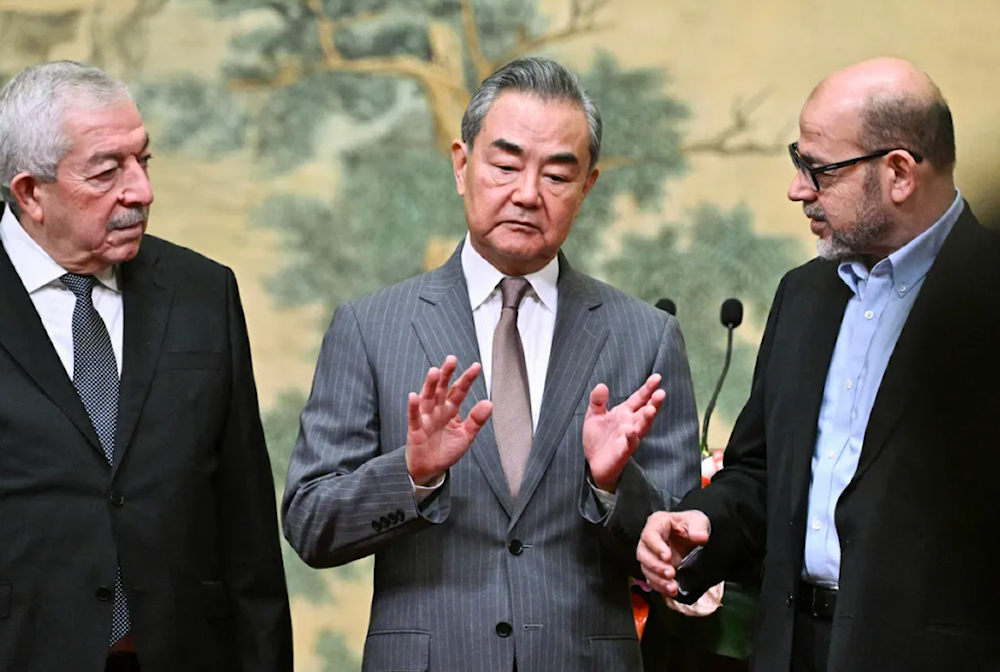Mere inter-Palestinian talks constitute loss for 'Israel': INSS
The discussions in Beijing establishes Hamas' legitimacy, making it harder for the occupation to impose a "day after" on Gaza without the movement's involvement.
-

China's Foreign Minister Wang Yi, center, hosts an event for Mahmoud al-Aloul, left, vice chairman of Fatah, and Moussa Abu Marzouk, a senior member of Hamas, to meet at the Diaoyutai State Guesthouse in Beijing, Tuesday, July 23, 2024. (AP)
Although the path to reconciliation between Fatah and Hamas is possibly a long one, it is nevertheless a blow to "Israel", the Israeli "Institute for National Security Studies" (INSS) revealed.
Palestinian factions met in Beijing, China, to discuss efforts to end national division and launch a process for reconciliation between major political parties.
The meetings saw the participation of 14 Palestinian factions, including Fatah, Hamas, the Palestinian Islamic Jihad, the Popular Front for the Liberation of Palestine, and the Democratic Front for the Liberation of Palestine.
UN Secretary-General Antonio Guterres welcomed the accord brokered.
"I think all steps towards unity are to be welcomed and encouraged," his spokesperson Stephane Dujarric said, adding that Guterres "very much welcomes the signing of the Beijing Declaration by the Palestinian factions."
Al Mayadeen obtained a copy of the Beijing Declaration in which the participants promised to "end the Palestinian national division" and to "unify national efforts to confront the [Israeli] aggression and stop the genocide."
The discussions in Beijing, together with China's support at the UN, maintain Hamas' legitimacy, making it harder for the occupation to establish a "the day after" solution in Gaza without the movement's involvement, INSS affirmed.
In an X post, the Israeli institute cited "concern" about violations of Israeli interests, and, according to a Jerusalem Post analysis, if Palestinian parties agree to more unity under China's direction, "Israel" may find itself in a tough situation, allowing supporters of Hamas like Russia, Turkey, and Qatar to advocate for a stronger role of the Palestinian Resistance in the West Bank.
According to JP, Hamas is utilizing the discussions in China to gain a stronger foothold in the West Bank, while still viewing Operation Al-Aqsa Flood as a victory.
In addition, the Palestinian Resistance's operations in the West Bank and particularly in Tulkarm recently is clear proof that Hamas is gaining ground there.
This comes contrary to "Israel's" objective since 2007, which has been to keep Gaza and the West Bank separate while isolating Hamas in Gaza. Since the onslaught on Gaza began, Hamas has yet to be defeated or removed from power in Gaza, making the meetings in Beijing crucial.
As "Israel" continues to fail to eradicate Hamas, it will pursue greater regional influence by leveraging support from Beijing, Ankara, Tehran, and Doha.
Operation Al-Aqsa Flood did not isolate Hamas, as sought by the Israeli occupation, instead, it strengthened the movement in certain respects.
According to Time, the question of Palestinian political unity might hinder Israeli plans for a postwar leadership structure in Gaza, which is one of the most contentious subjects in the ongoing ceasefire talks.
The accord also highlights China's rising importance in Middle Eastern diplomacy, as seen by the successful restoration of relations between Saudi Arabia and Iran.

 3 Min Read
3 Min Read








